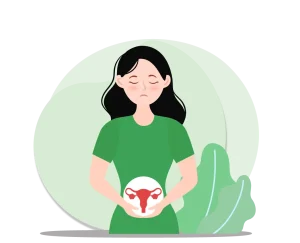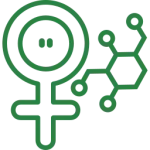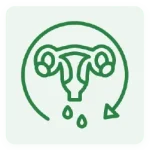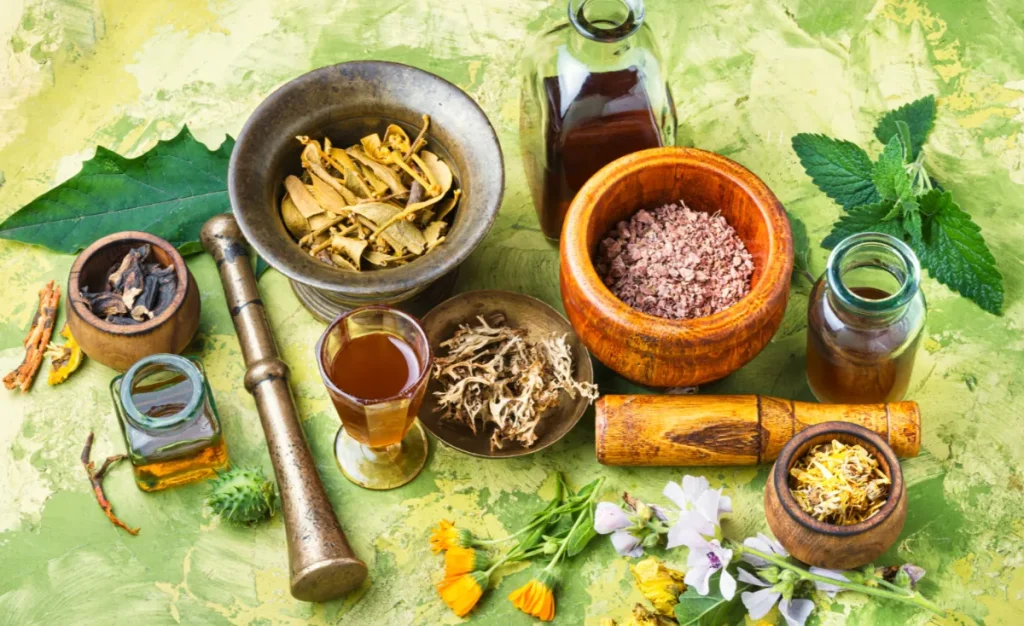

Poly-Cystic Ovarian Disease (PCOD) is a complex heterogeneous disorder of unknown etiology. It affects 1 in 10 women. It is a condition in which patients have multiple cysts in their ovaries that occur due to disruption in the normal menstrual cycle. Ovaries get enlarged and produce excess amounts of androgen and estrogen. These hormones interfere with the growth and release of the eggs from the ovaries, leading to anovulatory cycles and irregular menstruation.
 High levels of androgen
High levels of androgenHigh levels of insulin
Insulin resistance, which may result from unhealthy lifestyle and eating habits, causes type 2 diabetes that leads to obesity. It also leads to high levels of insulin that interrupt the functions of other hormones and physiologies, leading to PCOS.
 Menstrual abnormalities like infrequent, irregular or absence of menstrual cycles.
Menstrual abnormalities like infrequent, irregular or absence of menstrual cycles.

 Acne, hirsutism (male pattern hair growth on face and chest), hair fall from the scalp, or alopecia due to high levels of masculinizing hormones.
Acne, hirsutism (male pattern hair growth on face and chest), hair fall from the scalp, or alopecia due to high levels of masculinizing hormones.
 Metabolic disturbances lead to obesity, high cholesterol, hypothyroidism, etc.
Metabolic disturbances lead to obesity, high cholesterol, hypothyroidism, etc.

Psychological disorders like depression and anxiety due to personal and societal stress.
According to Ayurveda, PCOS is primarily caused by an imbalance in the Kapha and Vata doshas. This imbalance disrupts the functioning of the reproductive system, leading to hormonal irregularities. Ayurveda emphasizes the need for holistic healing to restore the balance of these doshas and alleviate PCOS symptoms.

The management depends on the presenting symptoms and may include the following:
Ayurveda experts for PCOS at Aadhiayurveda Treat PCOS strategically with 90-150 days of medicines which can rectify symptoms like absent /scanty menstruation with medicines like MENSOFLOW KASKAYA , CP MAP , AV MAP, NOVACALM , SAPTASARA KASHAYAM, RAJAPRAVARTHINI VATI etc. There are various Ayurvedic herbal medicines and formulations to address PCOS symptoms.

Ayurveda doctors, at Aadhiayurveda , prepare a combination of herbs such as Shatavari, Ashoka, and Lodhra to regulate menstrual cycles and hormonal imbalances, reduce acne and hirsutism, and improve fertility based on the diagnosis obtained from detailed examination.

Stress is a significant factor that contributes to PCOS symptoms. Specific yoga poses like Dhanurasana (Bow Pose), Bhujangasana (Cobra Pose), and Paschimottanasana (Seated Forward Bend) help regulate hormonal function, improve blood circulation, and reduce stress.
At Aadhiayurveda Ayurveda, our yoga experts assist women with PCOS with various yoga asanas that enhance the body’s ability to reduce the severity of the disease.
Copyright © 2024 Aadhiayurveda, All Rights Reserved.